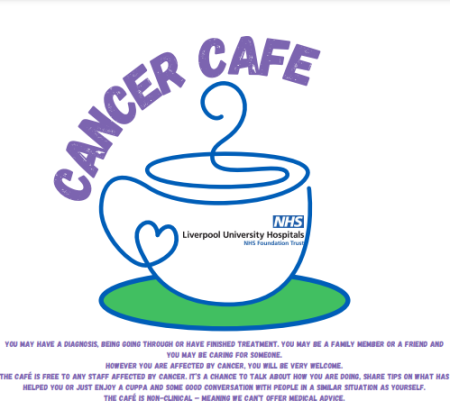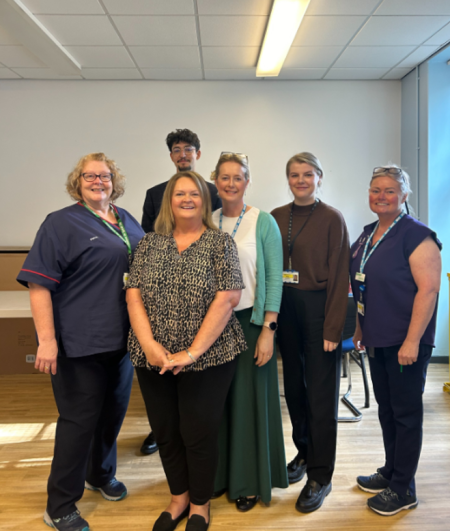Cancer Café


Vision Statement
We will provide a psychologically safe, supportive, and informative environment for staff who are either living and working with a diagnosis of cancer, or those staff who are helping to care for and support close family members with a cancer diagnosis. This will take place in an area where people can share stories, learn from, and support each other. Facilitated by trust staff from various backgrounds who have expert experience to facilitate such a psychologically safe environment. There will also be the opportunity to signpost for ongoing information and support where it is requested.
What is the cancer cafe?
This is an informal meeting space for you to speak to people in a similar position and to be signposted to relevant support. Come and have a cuppa and a biscuit with us!
This is not an environment in which you will be given clinical advice - you will be advised to contact your clinical team for these queries
Who can attend?
Anybody who is employed by the trust who's life has been touched by cancer. This includes staff who may be undergoing treatment, their friends and colleagues and their managers who may benefit from additional support
Dates of Cancer Cafes 2025
A cancer cafe will be held each month, rotating through the 3 main sites:
Please note that due to staff shortages, the Cancer Cafe has been temporarily suspended. When the teams are in a position to resume, dates will be added here. In the meantime, please contact cancer.cafe@liverpoolft.nhs.uk if you have any questions
Cancer of the month:
June 1st is Cancer Survivors Day, to celebrate life and raise awareness and support for those living after cancer.
Macmillan Information
Each year, about 4,300 people in England are diagnosed with a soft tissue sarcoma.
About 550 people are diagnosed every year with primary bone cancer in the UK.
The symptoms of soft tissue sarcoma depend on the part of the body that is affected. The main symptom is a lump or swelling. For example, a lump in the leg or arm, or other part of the body, that is:
• getting bigger
• bigger than 5cm (2in) – about the size of a golf ball
• painful or tender.
Most soft tissue lumps are not cancer. But if you notice any of these symptoms, it’s important to get them checked by your GP.
A tumour in a bone can cause symptoms which include pain, tenderness or swelling in the area affected. This may be made worse by exercise and feels worse at night. You may also have reduced movement if the tumour is near a joint. If the affected bone is in the leg, it may cause a limp
Many of these symptoms can be caused by other conditions that are much more common than bone cancer. But always see your GP if you have an unexplained pain in area of your bones, that does not go away.
https:/
find out How Well Do You Know the Signs of Sarcoma? Take the test
Support for Staff:
Staff guidance for returning to work after cancer
Managers guidance for supporting staff with cancer
Spiritual and Cultural Support
Macmillan Information and Support Centers
Liverpool University Hospital Foundation Trust
Aintree 0151 529 4742
Royal 0151 7063720
Email: macinfo
Who might I meet at the Cancer Cafe - our bios
Rachel - Macmillan Therapist:
I am Rachel, a dedicated acupuncturist, clinical reflexologist and oncology scar therapist with over three years of volunteer experience in the Royal’s Wellbeing Centre. I am passionate about supporting both patients and staff, and find joy in seeing how even a single hour of care can leave people feeling happier and more balanced.
I am driven to fostering a supportive community for healthcare staff navigating the challenges of cancer — whether personally or while caring for a loved one. We are committed to providing the same empathy and encouragement we offer our patients because those who care for others deserve care too.
At the Cancer Café, I also lead sessions where participants can blend their own aromatherapy-smelling sticks and learn techniques to lower stress and anxiety. These practices provide a calming and therapeutic experience, helping to create a sense of peace for everyone involved. We offer a listening ear, helping individuals navigate emotional challenges, and signpost them for referrals to the Wellbeing Service when needed.
Kelly - Patient Representative:
My name is Kelly, and I am the Education Services Manager for LUHFT. I’m a registered nurse of almost 30 years with a passion for making a difference for our staff and patients.
At the start of 2023 I was given a palliative cancer diagnosis. Staying in work was important to me as it gave me a purpose and an ability to keep a “normal” life. Navigating the early days was really difficult, however the support of my colleagues was invaluable to me.
If I can take anything from this part of my life, it would be to share my lived experience as a patient ambassador and representative to help the trust support others in a similar position, whether that is to remain in work or not.
At the cancer café I’m happy to share my experiences and resources I’ve found useful, or simply to listen and be able to understand how difficult this can be for us.
Macmillan Team:
Cancer Wellbeing Service.
The Cancer Wellbeing Service is here to support people affected by cancer. We offer a range of therapies to help with relaxation and wellbeing, including massage, reflexology, aromatherapy, and mindfulness. These therapies can help with stress, anxiety, fatigue, and some side effects of treatment.
We also provide emotional support, self-care advice, and guidance on managing the physical and emotional challenges of cancer. Our team works closely with other healthcare professionals to make sure you get the right support when you need it.
Whether you need help to relax, talk about how you’re feeling, or find ways to improve your wellbeing, we are here for you and your loved ones at every stage of your cancer experience
Macmillan Cancer Support Service - UHLG
The Macmillan Cancer Support Service at UHLG offers expert guidance, emotional support, and practical assistance to anybody affected by cancer. Our dedicated team provides specialist advice on living with a cancer diagnosis, financial concerns, employment issues, navigating the benefits system, and end-of-life planning. We also facilitate access to support groups, information about local and national services and organisations and deliver a self management 6-week course to enhance your resilience through difficult times. Through robust collaborative working with cancer nurse specialists, multidisciplinary teams, and partnering Trusts, we ensure a seamless, person-centred approach that integrates clinical care with comprehensive, holistic support throughout the cancer experience from diagnosis, through treatment and beyond.